- Home
- Anna Carey
Eve Page 7
Eve Read online
Page 7
Page 7
Teacher Agnes showed us secret images taken by security cameras perched on the wall. They were blurry, but there were three figures—three men. They cornered another, stole the supplies at his belt, and executed him with a shotgun. For weeks I woke up in the middle of the night, my skin slick with sweat. I kept seeing that white blast and the man’s limp body splayed out on the ground, his legs twisted.
“You didn’t need another one, you kill-happy Buggum!” another voice yelled. I backed farther into the house, pressing up against a rough, unstable wall. The air was hot and thick with the scent of mold and something sharper, something chemical. I pulled my shirt over my face, trying to muffle my breath as the men stomped past.
They were close now. I could hear them, each step cracking fallen branches with vicious snaps and pops. Someone stopped outside the shack. His breaths were raspy and choked with phlegm. “Whatcha gots there?” another one called. His voice was farther off, higher. Maybe on the road.
He cleared his throat and terror filled my chest. I held onto the wall of stones, trying to steady myself as I closed my eyes. Go away, please, please, I thought.
“Lock’s broken! Go on ahead, gonna take a looky here. ”
I pushed back as far as I could, wishing the cold stones would give way, that I could sink into them, disappear behind their pitted surface. There had been so many lessons on what was beyond the wall. Teacher Helene had held up the photographs of the woman who had had half her face mauled off by a rabid dog. But they’d only ever suggested one thing if we found ourselves outside, in the wild. They hadn’t taught us survival skills. I couldn’t make a fire, I couldn’t hunt, and I wouldn’t be able to fight this man off. Get back in, Teacher had said simply. Do whatever it takes to get back to School.
The door swung open. I was ready for him to plow forward, to drag me, screaming, outside. But as light flooded the long shack, I no longer cared about the gang on the road or the images from class or the intentions of the man standing around the corner, just twenty feet away. For the sunlight revealed walls made not of rough stones, but of hundreds of skulls, the black, hollow eye cavities peering back at me. I covered my mouth to keep from screaming.
“Just a morgue,” the man yelled. And then the door closed behind him, leaving me in the dark with the skeletons. I stayed there, shaking, for hours, until I was certain the men were gone.
Chapter Five
BY THE EIGHTH DAY MY LEGS ACHED AND MY THROAT burned. I moved slowly through thick brush on the side of the road, knocking back the branches with a broken tree limb I’d been using as a walking stick. I kept telling myself I would get to Califia. I kept telling myself that I would be safe soon, that as long as I stayed in the overgrowth, out of sight, the gangs wouldn’t find me. But my water bottle had been sucked dry days ago. Fatigue was chasing me. One moment I was sweating and the next I was shivering from the cold.
I’d moved west like Teacher Florence had instructed, toward the setting sun. At night, when the temperature dropped, I slept in the closets of abandoned houses or in garages, beside the shells of old cars. When I found a place I thought was safe I’d sit for a while, eating the apples Teacher had packed for me and thinking about School. I kept turning over that night in my head, wondering if it could have been different—if I could’ve saved Pip too. Maybe I should’ve taken the chance. Maybe I should’ve woken her up. Maybe I should’ve at least tried. My chest heaved with sobs when I imagined her strapped to one of those beds, alone and afraid, wondering why I’d left her.
It wasn’t long before I ran out of food. The cabinets of the homes were bare, scavenged by survivors in the aftermath of the plague. I tried to pick berries, but a few handfuls were not enough to appease the burning in my stomach. I grew weaker, my steps slower, until it was hard to walk more than a mile without having to stop for rest. I would sit at the base of trees, their gnarled roots holding me, and watch the deer bound through the tall grass.
Sometimes, right before the sun went down, I’d take my things out of my knapsack to look at them. I kept returning to that bracelet, so small it could barely fit around three of my fingers.
Like all the girls at School, I’d been an orphan. I’d come when I was five years old, after my mother was taken by the plague. I had never known my father. These items were the only things left from my past, with the exception of a few memories—feelings, really—of a mother combing the knots out of my wet hair, or the smell of her perfume as she rocked me to bed. I’d read once about amputees, and how they had pains where their arms or legs used to be. Phantom limbs, they were called. I’d always thought that was the best way to describe my feelings about my mother. She was now just an ache for something I’d had and lost.
I continued on, putting more and more of my weight on my walking stick. In the distance I spotted a tiny plastic pool where rainwater had collected, a bright turquoise oasis surrounded by weeds. I blinked twice, wondering if I was hallucinating from the day’s heat. I ran to it and fell, my lips touching the cool water. I wondered how long it had been there, if it was clean enough to consume, but it felt so good in my dry mouth that I didn’t stop until my stomach was painfully full. When I sat back I noticed a reflection on the surface of the water. There, a few yards off, was a house, lit from within.
I started toward the glowing light as the sun kissed the treetops. I didn’t know who was there or if they could help me, but I needed to at least find out.
A wooden playground had nearly collapsed in the yard. Vines wound around the swing’s rusted chain, yanking it toward the earth. Maneuvering under the broken slide, I approached a half-open window and peered inside. The living room was small, with only a rotted couch and a few cracked photographs hanging on the wall. A hooded figure crouched over a fire, cooking.
The smoke billowed up to the ceiling and spread outward, teasing my nostrils with the promise of a meat dinner. The figure picked at a leg of rabbit, feverishly biting at the bone. My mouth filled with spit just imagining how delicious it would taste.
I had seen a Stray before, grazing past the wall, in the section visible from the library’s corner window. Strays were not part of gangs, not part of the King’s regime, but outsiders who lived in the wild. We had been told Strays were dangerous, but this one had the slight build of a woman, which eased my fear.
“Hello there!” I called through the window. “I need help. Please!”
The figure sprung up from the floor and backed against the wall, holding the knife aloft.
“Show yourself!” Her hood was so large it shielded her face, but her dainty lips, greasy from the meat, were visible in the firelight.
“All right, please,” I said, raising my hands in front of me. I pushed at the window and the rusty hinges broke off, nearly sending it crashing into the room. I pulled myself inside, keeping my hands where she could see them. “I’ve run out of food. ”
She kept her knife outstretched in my direction. She had on dark green fatigues like the ones the government workers wore and her black hooded shirt was much too big. I couldn’t see her eyes.
Then, as I lowered my hands to my sides I saw the opened knapsack with the School uniform inside. The crest of The New America shone red and blue. I stepped back, slowly taking in her black combat boots, her tall frame, the beauty mark above her lip. “Arden?”

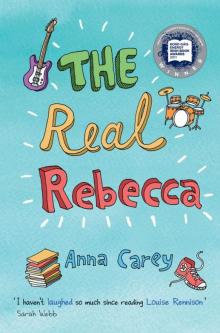 The Real Rebecca
The Real Rebecca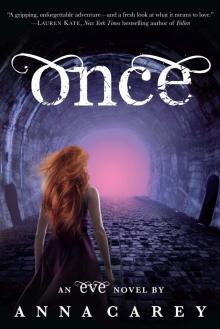 Once
Once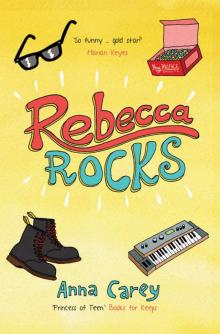 Rebecca Rocks
Rebecca Rocks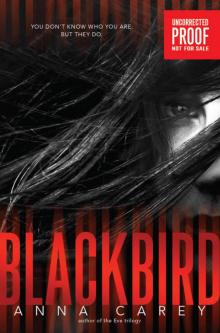 Blackbird
Blackbird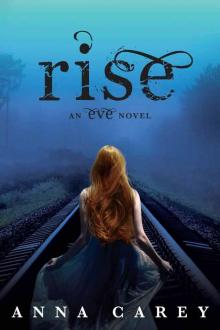 Rise
Rise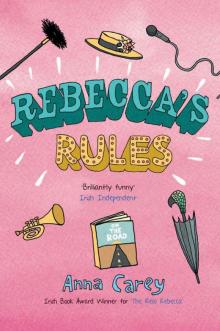 Rebecca's Rules
Rebecca's Rules Deadfall
Deadfall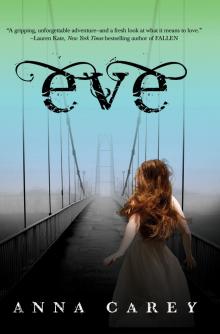 Eve
Eve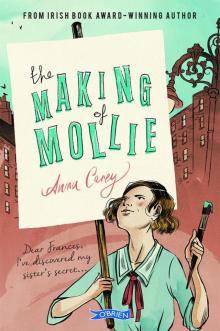 The Making of Mollie
The Making of Mollie Sloane Sisters
Sloane Sisters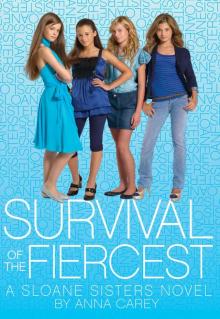 Survival of the Fiercest
Survival of the Fiercest This Is Not the Jess Show
This Is Not the Jess Show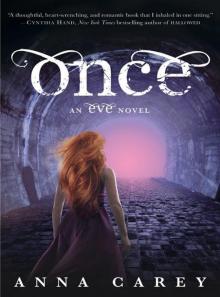 Once: An Eve Novel
Once: An Eve Novel